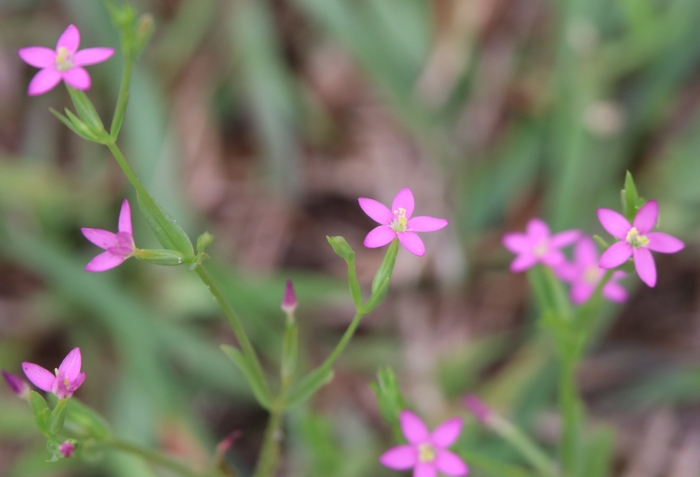Lesser Centaury
(Centaurium pulchellum)
Lesser Centaury (Centaurium pulchellum)
/
/

Lauren McLaurin
CC BY 4.0
Image By:
Lauren McLaurin
Recorded By:
Copyright:
CC BY 4.0
Copyright Notice:
Photo by: Lauren McLaurin | License Type: CC BY 4.0 | License URL: http://creativecommons.org/licenses/by/4.0/ | Rights Holder: Lauren McLaurin | Publisher: iNaturalist | Date Created: 2019-04-12T09:40:29-07:00 |

























Estimated Native Range
Summary
Centaurium pulchellum, commonly known as Lesser Centaury, is a small annual herb native to a variety of habitats including open grasslands, coastal areas, and disturbed sites across Europe and western Asia. It typically grows up to 4 inches tall and is characterized by its lack of a basal rosette of leaves and a developed peduncle below the flowers. Lesser Centaury blooms from June to September, producing clusters of pale pink, star-like flowers that are about 0.5 inches across and quite showy for the plant’s diminutive size.
This species is valued for its delicate beauty and ability to thrive in a range of soil conditions, from calcareous to mildly acidic. It is often found in sandy and muddy turf, saltmarshes, and disturbed ground in coastal and inland lowlands. In cultivation, Lesser Centaury can be used in rock gardens, as a border plant, or in wildflower meadows where its charming flowers can be appreciated. It prefers full sun to part shade and requires well-drained soil. While it is not demanding in terms of water, it does best with consistent moisture. Due to its small size and annual life cycle, it does not typically pose any significant problems in the garden.CC BY-SA 4.0
This species is valued for its delicate beauty and ability to thrive in a range of soil conditions, from calcareous to mildly acidic. It is often found in sandy and muddy turf, saltmarshes, and disturbed ground in coastal and inland lowlands. In cultivation, Lesser Centaury can be used in rock gardens, as a border plant, or in wildflower meadows where its charming flowers can be appreciated. It prefers full sun to part shade and requires well-drained soil. While it is not demanding in terms of water, it does best with consistent moisture. Due to its small size and annual life cycle, it does not typically pose any significant problems in the garden.CC BY-SA 4.0
Plant Description
- Plant Type: Herb
- Height: 0.5-1 feet
- Width: 0.5-1 feet
- Growth Rate: Slow, Moderate
- Flower Color: Pink
- Flowering Season: Summer, Fall
- Leaf Retention: Deciduous
Growth Requirements
- Sun: Full Sun
- Water: Medium
- Drainage: Medium, Fast
Common Uses
Border Plant, Butterfly Garden, Low Maintenance
Natural Habitat
native to a variety of habitats including open grasslands, coastal areas, and disturbed sites across Europe and western Asia
Other Names
Common Names: Lesser Centaury, Beautiful Centaury
Scientific Names: , Centaurium pulchellum, Centaurion pulchellum, Centaurion pulchellum, Centaurion pulchellum, Centaurium morierei, Centaurium pulchellum, Centaurium pulchellum var. pulchellum, Eryhtraea morierei, Erythraea balearica
GBIF Accepted Name: